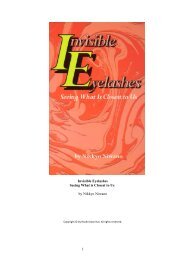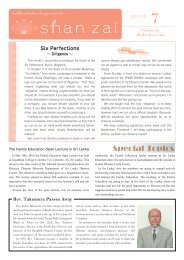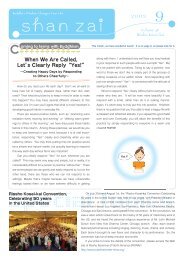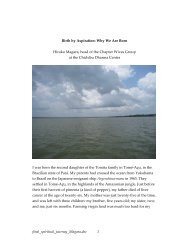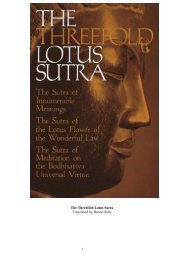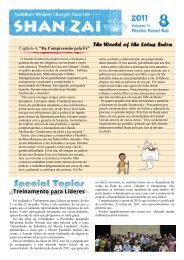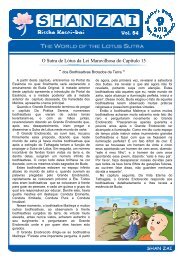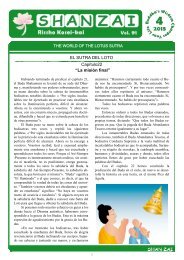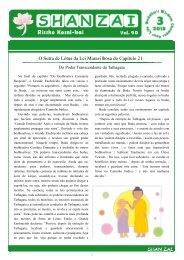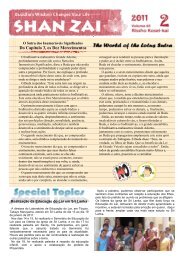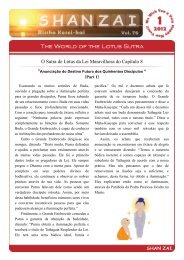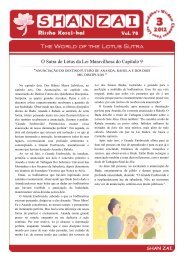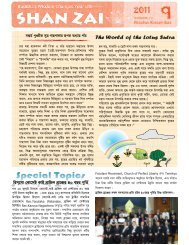2010 The Four Noble Truths - Rissho Kosei-kai
2010 The Four Noble Truths - Rissho Kosei-kai
2010 The Four Noble Truths - Rissho Kosei-kai
You also want an ePaper? Increase the reach of your titles
YUMPU automatically turns print PDFs into web optimized ePapers that Google loves.
on the way to buddhahood, and that every person is a would-be buddha. This<br />
is the meaning of the phrase “Not one fails to become a buddha” in chapter 2<br />
of the Lotus Sutra, “Skillful Means.”<br />
“Those who have faith in the Eternal Original Buddha and try to put Buddhist<br />
teaching into practice can discern the form of the Eternal Original<br />
Buddha and hear the sound of his preaching in everything they see, hear,<br />
and experience.”<br />
(Honzonkan no Kakuritsu no Tameni<br />
[For Confirming Our View of the Focus of Devotion] p. 68)<br />
One day, at the start of a leadership meeting of Dharma Center ministers,<br />
one of the ministers immediately raised his hand high and asked the founder’s<br />
opinion about his problem with a lack of members volunteering for night duty.<br />
<strong>The</strong> founder gave him a warm smile and answered as follows:<br />
“You have a lot of courage to be the first to ask a question in front of<br />
everyone about a problem most centers would not like to admit they have.<br />
With so much enthusiasm, you will no doubt work things out. I am sure you<br />
will receive the Buddha’s blessing.”<br />
<strong>The</strong> minister was asking the founder what he should do to encourage<br />
more people to sign up for night duty.<br />
However, the founder answered not by giving direct advice, but by praising<br />
his enthusiastic spirit, telling him things would work out all right. Hearing<br />
this, the minister realized that although he had been speaking to others that<br />
“all can attain buddhahood,” his own spirit had not yet settled into alignment<br />
with that thought.<br />
“Shravakas [disciples who hear and follow the Buddha’s teaching] and pratyekabuddhas<br />
[who engage in religious training without a teacher] can<br />
become bodhisattvas the moment they aspire resolutely to practice the bodhisattva<br />
way of saving sentient beings. Fundamentally, they have the same<br />
human nature as bodhisattvas.”<br />
(Shinshaku Hokke Sambu-kyo<br />
[New Commentary on the Threefold Lotus Sutra], vol. 2, p. 276)<br />
Rather than look at the true aspect of reality, we tend to make instant judgments,<br />
thinking “This is, or is not, how things should be.” We do this when we<br />
view daily events as negative phenomena. If, as the founder always did, we<br />
learn to discern the greatest possible joy in each present moment, it is possible<br />
that we can transform the everyday world into the world of the Buddha just by<br />
a single word. It is our own way of looking at things that unnecessarily makes<br />
the change difficult to happen.<br />
When problems do occur to us, it is in a sense wasteful to solve them right<br />
away. <strong>The</strong> Buddha’s purpose with respect to problem-solving does not concern<br />
whether we can solve our problems or not, but involves how we approach<br />
those problems and how our spirits rise to the occasion.



